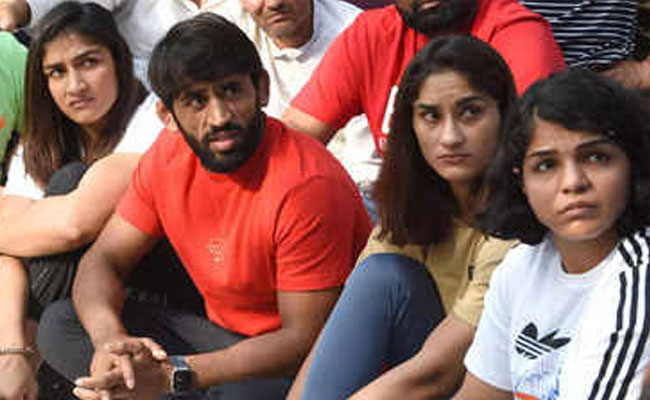
How the present fight between the wrestlers and the WFI chief is handled by the Government will have a major impact on the future of women’s participation in sports in India.
Many months ago, when the news first broke of a group of professional wrestlers, including Olympic medalists Sakshi Malik, Bajrang Punia and World Champions Vinesh Phogat, Deepak Punia accusing the Wrestling Federation of India (WFI) president and BJP MP Brij Bhushan Sharan Singh of sexual harassment, intimidation and misconduct, there was a sense of shock and disbelief across the nation.
While some tended to disbelieve the wrestlers, and some accused them of playing dirty politics, a vast majority found it hard to dismiss what they were saying. After all, these grapplers are highly popular sportspersons of immense stature. One would think that they would not make such serious allegations against someone who has the power to destroy their careers, without substance or without first weighing the consequences. In coming out in the open and going up against such a well-connected and powerful MP, the grapplers had put their entire careers on the line. So, it was expected that the response of the powers that be, would be swift and the matter would be sorted out quickly. And if the accusations proved to be true then the guilty party or parties would be dealt with according to the law of the land.
So, it came as a surprise when no action was taken, and not even an FIR was lodged in the initial stages, till the Supreme Court of the country came down on the police. In the end, the wrestlers, who had initially told all political parties to stay away from their protest, had to admit defeat and with folded hands request the people of the country, including politicians, to join their fight for justice.
The sight of the seven wrestlers, who have won laurels for the country, some of them even the coveted Olympic disks in a medal-starved nation, sitting on a dharna through rain and shine is saddening, worrying, demoralising and makes one wonder about the impact of this incident on the future of women in sports in India, especially contact sport.
Because as we all know, it is not easy for a country like ours to churn out sportsmen, leave alone sportswomen. Stories of legendary battles with poverty, the need to provide for the family, lack of facilities and parental support are all too common in our country. And if you are a girl then the battle has another dimension of gender bias and the fears of the parents about the safety and security of their girls in the sports camps, academies, and during sports events that are held thousands of miles away from home. After all, we are a developing, Asian nation where the ‘izzat’ of the ‘beti’ is of paramount importance.
Look how many decades it has taken us to get our girls to play cricket and for cricket fans to take women’s cricket even half as seriously as they do men’s cricket. We all know the pathetic state of women’s football, hockey, kabaddi and so on. Even women’s boxing was in the shadows till Mary Kom burst upon the scene.
So this nasty episode with the wrestlers will certainly impact the entry of girls into sports. And, sadly, this is not the first time that allegations of sexual misconduct by those who are meant to train and protect the sportswomen have come to the fore recently. In June 2022, a woman cyclist complained of inappropriate behaviour by national team chief coach RK Sharma during an overseas training camp in Slovenia while in July 2021, seven more female athletes accused Tamil Nadu’s track & field coach P Nagarajan of sexual abuse over several years. In January 2020, Delhi Police registered an FIR in connection with the alleged molestation of a female cricketer by her coach in southeast Delhi’s Nizamuddin area, while in September 2014, a complaint of sexual harassment of a woman gymnast by her coach Manoj Rana and fellow gymnast Chandan Pathak surfaced.
Forget about young girls in sports, even women coaches have faced harassment and the most recent sexual harassment allegation was against Haryana Minister Sandeep Singh. Even the hallowed grounds of the Sports Authority of India have been tainted by allegations of sexual misconduct, and in 2018, the Sports Authority of India received shocking complaints of sexual harassment from its centres in Gujarat, Bengaluru and Tamil Nadu from athletes and a woman coach.
To be honest, India is not the only country where we face this issue. There have been similar instances globally, too, but that does not mean that “yeh sab chalta hai.” No, sexual harassment, molestation and abuse are not ok and not to be tolerated. We should not be asking our girls to keep quiet, we must encourage them to speak up.
So, that is why, how the Government cracks down on sexual misconduct by people in positions of power in sporting associations is vital to make sportswomen feel safe and encourage more girls to take up sports.
On its part, the Government has time and again stressed on the importance of Internal Complaints Committees (ICCs) in the workplace and in sports federations, too. The ICC is supposed to be the first responder to any grievance of sexual misconduct under the Sexual Harassment of Women at Work Place (Prevention, Prohibition and Redressal) Act or POSH Act as it is more commonly called. It is a vital element in the creation of a safe environment for women in the workplace, which also obviously includes the sporting world. As per the law, the ICC must comprise of a minimum of four members, at least half of them women. And one of the members has to be an external entity, preferably a lawyer, social worker or an association that works for women’s rights and safety.
In fact, an ICC is one of the main conditions set by the Ministry of Sports for granting recognition to the sporting federations that get renewed annually. In fact, on January 23, the day the Union Sports Ministry formed the Mary Kom-led committee to investigate allegations of sexual harassment against Singh, it sent a letter to all national sports federations flagging up the importance of the ICC
Not surprisingly, the WFI does not have an ICC, and even more shockingly, so don’t 16 of the 30 national federations of sports in India. And these are sports in which our country has participated in the Asian Games, Tokyo Olympics, and Commonwealth Games!! It makes one wonder why it is so. An honest answer to this can be quite disquieting, especially as there has been a 161 per cent rise in the number of girls/women participating in sports in the country between 2018 and 2020.
So, if the country is serious about encouraging the participation of girls/women in sports then there has to be a massive clean-up of the whole set-up.
Sportspersons, of both genders, have to be assured of all safety. They have to be made aware of what rights of redressal they have in the event of any misconduct. Most importantly, there has to be an atmosphere of ‘zero tolerance’ towards sexual harassment, misconduct, and abuse by anyone in the sporting world. Be it the sportspersons, coaches, therapists, support staff, officials, and management committees right up to the presidents of the federations.
How the present fight between the wrestlers and the WFI chief is handled by the Government will have a major impact on the future of women in Indian sports. It’s a big responsibility for the Government which has given the clarion call of ‘Beti Bachao, Beti Padhao.’ No innocent should suffer injustice and the guilty should not be spared. As accusations from the wrestlers and denials from the WFI chief fly thick and fast, only time and an impartial, thorough probe will sift the truth from the lies. India is keenly watching this dangal between the wrestlers and the WFI chief. One can only say, ‘Satyamev Jayate.’













